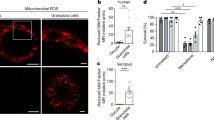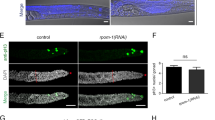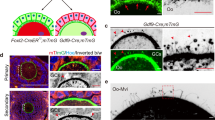Abstract
In females of many species, over half of the germ-cell (oocyte) population dies by apoptosis before birth1. For example, germ-cell numbers peak at 5–7×106 at week 20 of gestation in humans, but drop to less than 1×106 in the early neonatal period2,3. Apparent germ-cell wastage occurs on a similar scale in female rodents, falling from 6.4×104 at day 17.5 of pregnancy to 1.9×104 shortly after birth4. Krakauer and Mira5 have interpreted this death of germ cells as a developmental solution to the accumulation of mutations in mitochondria, proposing that prenatal oocyte apoptosis effectively removes oocytes carrying mutant mitochondria. Here we test whether mitochondria can actually influence oocyte fate by microinjecting small numbers of mitochondria into mouse oocytes and find that this prevents these cells from undergoing apoptosis. We also show that a common mitochondrial DNA deletion occurs more frequently in unfertilized, as compared with fertilized, human oocytes.
This is a preview of subscription content, access via your institution
Access options
Subscribe to this journal
Receive 51 print issues and online access
$199.00 per year
only $3.90 per issue
Buy this article
- Purchase on Springer Link
- Instant access to full article PDF
Prices may be subject to local taxes which are calculated during checkout

Similar content being viewed by others
References
Morita, Y. & Tilly, J. L. Dev. Biol. 213, 1–17 (1999).
Baker, T. G. Proc. R. Soc. Lond. B 158, 417–433 (1963).
Forabosco, A. et al. Anat. Rec. 231, 201– 208 (1991).
Beaumont, H. M. & Mandl, A. M. Proc. R. Soc. Lond. B 155, 557–579 ( 1961).
Krakauer, D. C. & Mira, A. Nature 400, 125–126 (1999).
Morita, Y. et al. Mol. Endocrinol. 13, 841– 850 (1999).
Tilly, J. L. et al. Endocrinology 136, 232– 241 (1995).
Perez, G. I. et al. Nature Med. 3, 1228– 1232 (1997).
Perez, G. I. et al. Mol. Hum. Reprod. 5, 414– 420 (1999).
Piko, L. & Matsumoto, L. Dev. Biol. 49, 1–10 (1976).
Lee, H. C. et al. Biochim. Biophys. Acta 1226, 37– 43 (1994).
Faddy, M. J. et al. Hum. Reprod. 7, 1342– 1346 (1992).
Perez, G. I. et al. Nature Genet. 21, 200– 203 (1999).
Tilly, J. L. & Robles, R. in Molecular Biology in Reproductive Medicine (ed. Fauser, B. C. J. M.) 79–101 (Parthenon, New York, 1999).
Author information
Authors and Affiliations
Corresponding author
Rights and permissions
About this article
Cite this article
Perez, G., Trbovich, A., Gosden, R. et al. Mitochondria and the death of oocytes . Nature 403, 500–501 (2000). https://doi.org/10.1038/35000651
Issue Date:
DOI: https://doi.org/10.1038/35000651
This article is cited by
-
Impact of NAD+ metabolism on ovarian aging
Immunity & Ageing (2023)
-
Nicotinamide mononucleotide supplementation improves the quality of porcine oocytes under heat stress
Journal of Animal Science and Biotechnology (2022)
-
Glyphosate exposure deteriorates oocyte meiotic maturation via induction of organelle dysfunctions in pigs
Journal of Animal Science and Biotechnology (2022)
-
The process of ovarian aging: it is not just about oocytes and granulosa cells
Journal of Assisted Reproduction and Genetics (2022)
-
A recessive variant in TFAM causes mtDNA depletion associated with primary ovarian insufficiency, seizures, intellectual disability and hearing loss
Human Genetics (2021)
Comments
By submitting a comment you agree to abide by our Terms and Community Guidelines. If you find something abusive or that does not comply with our terms or guidelines please flag it as inappropriate.



